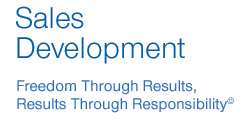A Rapid Formula to Improve Your Profit Margins
May 5th, 2009I recently met a CEO who was asking for advice on maintaining profit margins. He was frustrated by his sales manager, who kept requesting permission to offer give-aways and discounts. He wanted to know if Z3 Performance Development could train his people to become better negotiators. After a bit of probing, it became obvious that this CEO possessed a popular misconception, one that had him believing that salespeople should be “negotiating” (aka: dropping prices or offering concessions in exchange for a promise to buy).
Negotiation includes built-in conflict. It has potential to break down trust. It occurs when salespeople (or principals) try to convince or “sell”. If you are committed to helping your clients succeed, you will need information from them. To gather information, you will need to ask questions and listen actively. The intent of a person’s questions is a vital determinant of their effectiveness. Your clients and prospects are constantly making decisions about what questions are safe to answer. As they make these decisions, they are continually sizing up your trustworthy-ness. In this dialogue, intent is always more important than words. So if you are a person who “sells”, I would suggest you look into the mirror and ask yourself this honest question. “Is the intent of my questions to help our clients get what they want in a way they feel good about, or is it to help me get what I want in a way I feel good about?” In other words: Whose agenda are you really on?
It is difficult to understand why anyone would intentionally choose to create conflict with a client. However, I watch salespeople and businesspeople do it everyday. Trusted advisors and superior salespeople do everything possible to AVOID negotiating. They seek to facilitate the mutual discovery of costs (both tangible and emotional) of buyer’s problems. They will then determine what level of commitment and resources are available to solve them before discussing the best solution.
The majority of people like to listen selectively and to avoid “tough” questions, the ones most vital to successful transactions. They avoid selling properly because they are not comfortable talking about things like money and decision processes, so they defer any conversation of these topics as long as possible—forcing a conversation into a negotiation. When trust deteriorates and they begin to feel separation occur, fight or flight takes over and they try to close the sale, setting up all sorts of problems.
Salespeople who find themselves in frequent negotiations likely possess one or more of the following (extremely costly) symptoms or blind spots:
- They are uncomfortable talking about other people’s finances
- They feel the product or service they sell is expensive
- They believe that buying is an intellectual process, not an emotional one
- They don’t gain an understanding of the costs associated with the problem. If they do, it is typically far too late in the discovery process.
I’m not suggesting that great salespeople never need to negotiate. However, if you, your partners or your salespeople are finding that price reductions and concessions are occurring too frequently, it is a good idea to evaluate your people to see if the blind spots above are present and to implement a system to erase them. The results will fall quickly to your bottom line.
Bookmark the CEO Success Blog!









